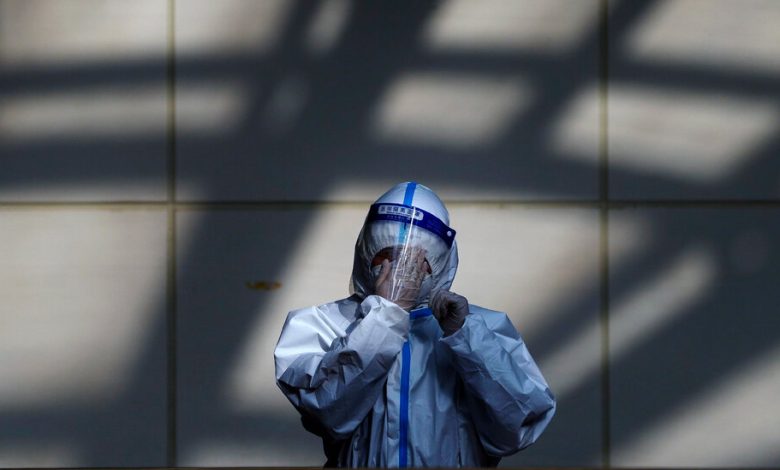Xi Loosens Up. It Won’t Be Enough.

Xi Jinping may be the most powerful autocrat in the world, but he was forced this week to pirouette to meet the demands of ordinary Chinese fed up with his failed “zero Covid” strategy.
Throngs of ordinary Chinese — “old hundred names” in Chinese parlance — took to the streets to express frustration with China’s repressive Covid lockdowns and, implicitly, with China’s overall repression. Many held up blank sheets of paper, signifying that they could not say what they wanted.
Xi read those blank sheets of paper, though. Police detained many protesters and blocked off areas where people might gather — but the Chinese government still was forced to bow to public opinion. It brightly declared a “new situation” and on Wednesday relaxed its Covid policy.
Without much acknowledging the protests and while pretending that this was all its own idea, the Chinese leadership declared an end to many of the most burdensome elements of its Covid policy, which has kept down the virus, as well as the Chinese people.
Lockdowns will become shorter and more targeted, and people who test positive for the coronavirus with mild symptoms can stay at home instead of being taken away to quarantine. Negative tests will no longer be routinely required in most public spaces. Cold medicines, whose sales had been curtailed so people couldn’t hide their Covid symptoms, will be available again.
The government’s response, though, does not, of course, address the larger yearning for an end to autocracy.
The dictatorship remains, and those detained as a result of the street protests are presumably still in jail. But Wednesday’s announcement is a remarkable turnabout.
Historically, popular protests in modern China have not resulted in more freedom but in less. In 1956, Mao decided to “let 100 flowers bloom” — but then was horrified when some of this intellectual blooming was critical of his rule. The upshot was a crackdown that sent some of my Chinese friends to labor camps for two decades.
In April 1976, a popular protest against the hard-liners led them to sack one of the reformers, Deng Xiaoping. In 1978 and ’79, calls on the “Democracy Wall” for greater freedom led to the imprisonment of activists like Wei Jingsheng. In 1986, student protests for greater liberalization led to the firing of the Communist Party leader who favored liberalization, Hu Yaobang.
Then the 1989 Tiananmen democracy movement was a profound cry for greater freedom — and the result was a massacre, long prison sentences and the rise of hard-liners who have made the nation less free.
So it feels like a historic milestone that Xi was forced to bow to protests, but the easing may be costly.
Xi managed the pandemic adeptly for a time, reducing Covid mortality to levels that almost any country would envy. Yet as vaccines became available, Xi didn’t adapt well. He didn’t import more effective mRNA vaccines from the West and didn’t sufficiently promote vaccinations and boosters for the vulnerable and elderly. He kept up the lockdown policy long after it was sustainable, partly because of the classic dictator’s difficulty in assessing the opinions of people when you imprison them for speaking up.
The upshot is that any rapid relaxation of Covid rules today, without first raising vaccination rates among the elderly, may lead to hundreds of thousands of Chinese dying from Covid. That is on Xi.
One of China’s great paradoxes is that in many areas, it is an administrative marvel adept at self-correction. It has overseen infrastructure development and education improvements that are extraordinary: The life expectancy of a child born in Beijing today is higher than that of a child born in Washington, D.C. Yet Chinese leaders have often struggled to self-correct in the ideological realm.
The result: China’s authoritarian rulers have overseen the rise of an urban, well-educated middle class that aspires to greater participation, yet “People’s China” refuses to let people do so.
In the reform era, China arguably bought off many of its citizens by raising incomes. The implicit deal was that the government would let people improve their lives but not fully determine their lives. Xi broke that deal with his Covid policy, which made lives worse.
Many years ago, when I was a Beijing correspondent for this newspaper, covering the Tiananmen protests, a young man put the nation’s aspiration this way: “We have rice, but we want rights.”
In the latest protests, slogans were similar: “We want freedom, not lockdowns. We want votes, not a ruler. We want dignity, not lies. We are citizens, not slaves.”
Those brave protesters have changed China’s national policy, and their broader yearning for rights can no more be extinguished than a virus; someday the Chinese Communist leadership will have to respond to that very human aspiration. Xi may remain in charge, but a legacy of this year’s protests may be the reminder that this yearning still flickers, just beneath the surface, in the most populous nation on earth.
The Times is committed to publishing a diversity of letters to the editor. We’d like to hear what you think about this or any of our articles. Here are some tips. And here’s our email: [email protected].




